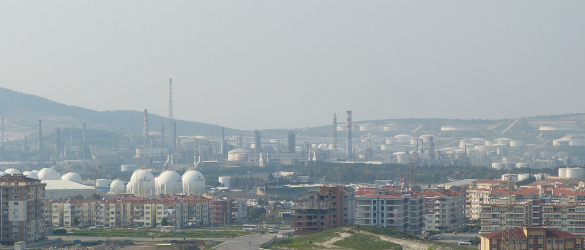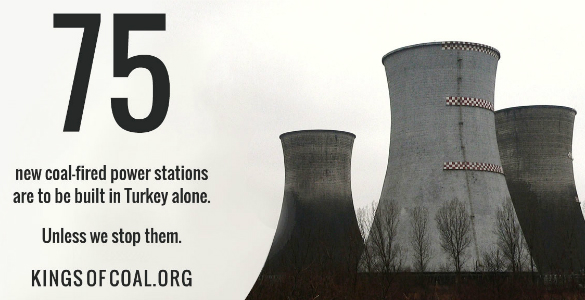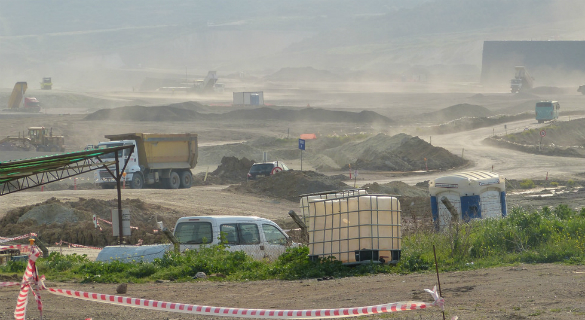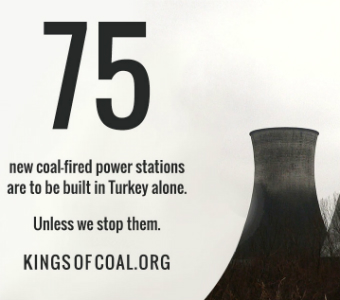Traveling back from a fact-fining mission in Turkey in March, I was just boarding the plane leaving Istanbul when I received an email announcing the EBRD’s withdrawal from the controversial Socar STAR refinery and coal power plant project in Aliaga.
Aliaga in western Turkey is a city already now plagued by countless highly polluting facilities, including the country’s largest oil refinery. According to locals, 8 out of 10 people in the village have some form of cancer, and even 2 year old children have died from throat or lung cancer. With a Board decision expected in early April, our mission to the project site in Turkey was to collect evidence and arguments for stopping the project altogether or at least the financial support from public banks.

The Aliaga industrial zone. (See more images in the slideshow below.)
Of course, as much as we celebrated the news that the EBRD’s loan was canceled, there’s a myriad of reasons why such a project should not be taken on by any financial institution – particularly one that announced tight restrictions for coal lending less than half a year ago. Even though the European Bank for Reconstruction and Development (EBRD) motivated its withdrawal with differences in the policies of the various lenders involved it is quite easy to notice why the Socar STAR project would not pass the EBRD’s conditions for financing coal.
Coming soon: New website for coal campaigners in Turkey and the Balkans

Because of some investors’ undiminished appetite for financing coal power, Bankwatch will publish a multilingual website next week that explains how to contact the investors behind a project, which policies guide their decisions and how best to influence them.
The skeleton in the closet
In 2010 the project company Aegean Refinery STAR Rafineri A.S. (“STAR”) [1] received a pre-license to start developing a $5.5-billion project involving the construction of a greenfield refinery in Aliaga as well as a ‘secret’ 1350 MW coal plant associated with the Socar refinery, but not included in the environmental and social impact assessment (pdf) for the project.
While the coal plant is essentially an integral part of the refinery project, the environmental and social impact assessments have been separated, and the coal plant has been excluded from the due diligence on the refinery project. The coal plant is meant to have two phases to construct a facility with a total capacity of 1350 MW, and two separate EIAs have been done so far. These EIAs were contested by local opposition (the Ege Environment and Culture Platform), and consultation meetings about the EIAs were canceled due to protests. The approval of the EIA for phase one has been challenged in court, and the approval of the EIA for phase two is pending.
Geothermal David versus oil Goliath
Another dirty secret that the oil giant would like forgotten is that in 2009, so a year prior to its own pre-license, the local renewables energy company Buhar Enerji had obtained a license to develop a 50MW hybrid geothermal-solar power plant. As designed now, the refinery and coal power plant would restrict access to a valuable geothermal energy resource. The geothermal reservoir is owned by the Turkish state and Buhar Enerji has been granted a 30-year operating license at least one year prior to that for the refinery. The EIA makes no reference to the geothermal reservoir and no stakeholder consultations have been held on this topic.
Adding value to the project behind the scenes, Socar has undertaken heavy excavation works between August 2011 and February 2014 (carried out by a construction company owned by the son of Aliaga mayor).

The Socar excavation works may have already destroyed the geothermal source. (See more images in the slideshow below.)
Buhar Enerji has managed to get a court investigation underway that notes that excavation works of the refinery are continuing in the absence of a legal construction permit and proper health conditions for workers. Currently the excavation works contract has been terminated and a local prosecutor has opened a court case against the mayor’s son (reported in the Aliaga Express newspaper).
Even though receiving an operating license a year before STAR, the small renewables venture was first sued by Socar, which argued that the tender result was invalid. While the court rejected Socar’s request, Buhar Enerji in its turn challenged the refinery’s license itself, the EIA, and has also submitted a complaint to the EBRD’s Project Complaint Mechanism.
So far, despite Socar’s heavy maneuvering at governmental level (see below), the outcomes are encouraging: the STAR refinery’s opening date has been pushed back to 2017, although most observers believe 2019 or 2020 are more likely.
The “SOCAR Law”
A law passed in February 2014 makes it quite obvious that the Turkish government is intervening to resolve the four-year-long legal dispute between Socar and Buhar Enerji – in SOCAR’s favor. The act, called the “SOCAR law” by Turkish media, gives a panel of three government ministers the right to cancel geothermal licenses that interfere with infrastructure or energy projects “in consideration of the public good and the needs of the economy.”
Invoking an allegedly ‘greater national purpose’ to push through big projects against the interest of locals or other stakeholders is something we have seen in other projects as well. Very often, however, vested interests are closely connected to those projects.
The Investment Incentive Scheme and its perverse effects
In early 2013, Turkey introduced an investment scheme to incentivise the coal power sector with the doubtful logic of justifying these “[a]s a part of its energy diversifying efforts” (Source).
The Turkish government has granted developers a very favourable form of corporate income tax allowances through investment participation rates, exemptions from customs duties and VAT, and support for employers’ contributions to insurance premiums. Investors that use domestic sources of coal to generate power have “the right to benefit from Region-5 level support instruments [2], the second most beneficial in the whole regime, regardless of the actual investment location (Source).
In other words, you don’t necessarily need to prove that there is a real need for the electricity you produce, to enjoy the benefits of being an energy producer in Turkey.
Moreover, the government also helps by providing favorable terms for the allocation of state-owned land near domestic lignite production sites or can expropriate privately owned land for energy generation projects which are considered of national interest.
There was something else….Oh, yes, the people!
Following intense public protests in the Aliaga-Izmir region in the early 1990s, plans for intensive industrial development were dropped by the local government. In the same year, Turkey’s Supreme Court forbade any further industrial development in the region due to the already high pollution levels at the time.
Although the Decision has not been revoked, the industry claims that the technology has improved and that pollution levels and health and environmental risks are much lower.
Outlook
After both the EBRD and the World Bank’s International Finance Corporation (IFC) announced their withdrawal from the planned USD 150 million loans each, SOCAR Turkey’s chief executive told Reuters that the firm had agreed with a commercial bank over fresh financing of $500 million to replace the EBRD and IFC loans. He refused to name the commercial bank, but sources close to the deal said it was Turkey’s Denizbank, owned by Russia’s Sberbank.
Other important players that would still power the project with significant amounts of money are the Italian UniCredit Bank, more precisely their German subsidiary, HypoVereinsbank, with the pivotal role of financial advisor and Deutsche Bank.
The export credit agencies involved are the U.S. Ex-Im Bank, the Japan Bank for International Cooperation, Export-Import Bank of Korea, and those of Italy, Canada and Spain.
Because there are still some investors with an undiminished appetite for financing coal power, Bankwatch will publish a multilingual website next week (focused on the Western Balkans and Turkey) that explains how to contact the investors behind a project, which policies guide their decisions and how best to influence them.
See it next week at KINGSOFCOAL.ORG
Slideshow
Notes
1. In 2007, when the Azeri state Oil Company “SOCAR” purchased the Petkim petrochemical plant from the Turkish Government, a star was born – Aegean Refinery STAR Rafineri A.S. (“STAR”), a joint stock company incorporated under the laws of Turkey. The joint venture is now 81.5% owned by SOCAR TURKEY Enerji A.S. (100% subsidiary Aerbaijan’s oil company) and 18.5% owned by TURCAS Rafineri Yatirimlari A.S (99.6% subsidiary of Turcas Petrol A.S.).
2. Region 5 and 6 (out of six regions altogether) are the least developed regions in Turkey and accordingly receive the most investment incentives. For more information see detailed information on the web site of the Investment Support and Promotion Agency of Turkey: http://www.invest.gov.tr/en-US/investmentguide/investorsguide/Pages/Incentives.aspx
Never miss an update
We expose the risks of international public finance and bring critical updates from the ground – straight to your inbox.

